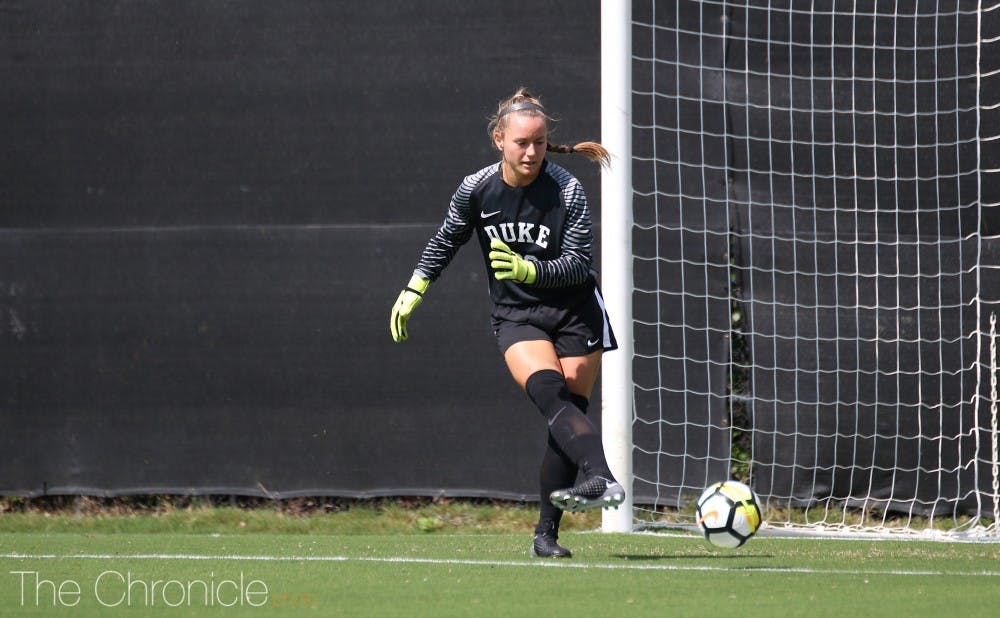When almost every team in the NFL protested President Donald Trump’s suggestion that players kneeling during the national anthem this weekend should be fired, it displayed the powerful role sports can play in bringing awareness to social issues affecting the country.
Nearly 4,000 miles from the first NFL protest of the day in London, the Duke women’s soccer team used its own platform to take up a different cause—sponsoring the program’s first annual Pride Game. Senior captain EJ Proctor, redshirt senior Rebecca Quinn and sophomore Mackenzie Coles spearheaded the effort with the hopes of “creating an inclusive space for all coaches, players and fans to come enjoy a game,” according to the event’s Facebook page.
“Sports are a common language, a uniter between everyone,” Coles said. “People look up to athletes, so if an athlete stands up for something that they believe in, then maybe people will try to change their minds if they don’t agree with equality.”
The Blue Devils took the field for warmups before their 2 p.m. contest against Pittsburgh sporting rainbow tie dye sweatbands, multicolored sunglasses and black “Be True” t-shirts with rainbow Nike swooshes on the front. Coaches Robbie Church, Erwin van Bennekom, Carla Overbeck and Lane Davis wore the t-shirts throughout the game, though the players changed into their regular jerseys just before kick-off.
Proctor, Quinn and Coles were also featured in a special halftime message displayed on the Koskinen Stadium scoreboard. The trio discussed what pride means to them and explained motivation for starting an annual Pride Game within the program.
“It’s something the girls felt very strongly about,” Church said. “Our captains approached us and we discussed it after they had touched base with their teammates, so they knew it was something they would like to have. They know some other teams at Duke have had pride games, so we decided to have one too.”
Proctor, Quinn and Coles all serve on the executive board of Duke's Athlete Ally chapter. According to the Athlete Ally website, the nonprofit organization “provides public awareness campaigns, educational programming and tools and resources to foster inclusive sports communities” on more than 80 college campuses.
Duke’s Athlete Ally chapter has been involved in various on-campus initiatives for promoting safe and inclusive spaces for all, including celebrations for Coming Out Day, marching in the Durham Pride March and picking an “Ally of the Month” among the Blue Devils' club and varsity sports teams.
“Our team is always really active with Athlete Ally, so we’re kind of using [the Pride Game] to promote Athlete Ally as well,” Proctor said. “We’re hoping to get more athletes involved and spread pride games or races or matches to other teams.”
Women’s soccer is not the first team on campus to sponsor a pride event. The field hockey team has had a pride game every season in recent years, and the women’s rowing team plans to host a pride event for one of this season’s races.
As a Bronze Medalist at the 2016 Summer Olympics with the Canadian National Team, Quinn noted that professional women’s soccer players have often been at the forefront of social activism. Both the men’s and the women’s U.S. National Teams and the National Women’s Soccer League have sponsored LGBT pride initiatives. The Toronto native said it was important for her and her teammates to extend the trend established by professionals to the collegiate level.
“Sports have a huge platform in speaking out on certain issues, especially in athletics and within women’s soccer,” Quinn said. “Players have a voice...There are some predominant roles in terms of LGBTQ equality specifically in sports, so this is the first step in where Duke athletics, and specifically Duke soccer, is heading.”
Proctor, Quinn and Coles, along with the rest of Athlete Ally, are turning their efforts to adding more Blue Devil teams to the list of programs who have pride events and continuing the legacy within the women’s soccer program in future years.
But beyond scheduling events and promoting Athlete Ally membership, the three players are most committed to creating a dialogue and increasing inclusivity around Duke’s sports.
“Now that we have a foundation for it, there are going to be Pride Games for many years to come,” Quinn said. “Hopefully there will be a time when we won’t need to have a Pride Game, and it’ll be an inclusive environment and everyone will be accepted for their gender and sexual identity.”
Get The Chronicle straight to your inbox
Signup for our weekly newsletter. Cancel at any time.

